NETGEAR is aware of a growing number of phone and online scams. To learn how to stay safe click here.
Forum Discussion
fifer55
Apr 24, 2013Apprentice
ReadyNas Ultra 6 Plus CPU Upgrade - Various
Hello,
This is a continuation to the upgrades I am doing on a ReadyNas Ultra 6 Plus (RNDP600U-200NAS) that I recently purchased. I decided to first upgrade the RAM. You can find what I choose, why and the brand here:
viewtopic.php?f=110&t=70664
Feeling like a rebel and with the confidence that the below thread gave me, I decided to upgrade the CPU as well. Might as well!
viewtopic.php?f=35&t=29284
Before anything, I made sure that I was able to procure the CPU's that I thought would best fit my needs, which were narrowed down to 3. I found them quickly and easily, all on eBay. The CPU's I bought are:
1) Intel Core 2 Duo E6600 2.40 GHz SL9ZL (~ $42)
http://ark.intel.com/products/27250
2) Intel Core 2 Duo E7600 3.06 GHz SLGTD (~ $45)
http://ark.intel.com/products/41495/Int ... 66-MHz-FSB
3) Intel Core 2 Quad Q6600 2.4 GHz SLACR (~ $55)
http://ark.intel.com/products/29765
Now, I have 2 ReadyNAS boxes:
A) ReadyNAS Pro Pioneer Edition (RNDP600E-100NAS) OR (ReadyNASRNDP6000)
B) ReadyNas Ultra 6 Plus (RNDP600U-200NAS)
For the above Pro Pioneer, I checked my registration on myNetgear.com and found that my serial number is associated with the ReadyNAS RNDP6000, NOT the RNDP600E-100NAS. My FrontView says ReadyNAS Pro Pioneer Edition?! I bought the system in 2010 from Dell.com. Anyway, it is ONE of those. Don't know which one for sure yet, but will edit as soon as possible.
OK, from the above, I was thinking of upgrading the Ultra 6 Plus with the Intel Core 2 Quad Q6600 first as it does not have ANY data on the drives and the upgraded RAM. Pretty sure that it could handle the Quad CPU without issues. Then, if everything goes well with the Ultra 6 Plus, thinking of upgrading the Pioneer Edition with the Intel Core 2 Duo E7600 and RAM. Bought the Intel Core 2 Due E6600 JUST in case any of the above had issues, then I would replace with a "slower" CPU.
Before I upgrade the CPU, wanted some ancillary products. Might as well!
Arctic Silver 5 Thermal Compound 3.5 Grams with ArctiClean 60 ML Kit (~ $10)
http://www.amazon.com/Arctic-Silver-The ... ML+Kit+NEW
OXO Good Grips Electronics Cleaning Brush (~ $6)
http://www.amazon.com/OXO-Grips-Electro ... ning+Brush
Hitachi Ultrastar 7K4000 HUS724040ALE640 4 TB 3.5" Internal Hard Drive (0F14683) (~ $400)
http://www.amazon.com/Ultrastar-7K4000- ... 14683%29+-
The Ultra 6 Plus already has the updated BIOS (07/26/2010 FLAME6-MB V2.0), RAM (8 GB) and latest full release RAIDiator (4.2.22) and NO data. First some metrics:
Current CPU check:
Current I/O, before any drives are configured:
Verify free and used memory in system (default command returns KB, but I wanted MB so I added * -m):
Since MY RAM is 7990 (MB) OR 8181844 (KB), I used the following dd command that I found here:
http://www.cyberciti.biz/tips/howto-lin ... check.html
The dd command completed in about 13 mins:
Now to verify the results of the above dd command via MD5:
Now for a memtester pass as suggested from:
http://www.cyberciti.biz/faq/linux-how- ... ry-faults/
Now for the CPU upgrade. I will start with the Intel Core 2 Quad Q6600. I am thinking this SHOULD work. After some cleaning to the Ultra 6 Plus, I pop it in.
Here are the same tests as above with the Intel Core 2 Quad Q6600:
Now the I/O with the Intel Core 2 Quad Q6600:
To be continued...
This is a continuation to the upgrades I am doing on a ReadyNas Ultra 6 Plus (RNDP600U-200NAS) that I recently purchased. I decided to first upgrade the RAM. You can find what I choose, why and the brand here:
viewtopic.php?f=110&t=70664
Feeling like a rebel and with the confidence that the below thread gave me, I decided to upgrade the CPU as well. Might as well!
viewtopic.php?f=35&t=29284
Before anything, I made sure that I was able to procure the CPU's that I thought would best fit my needs, which were narrowed down to 3. I found them quickly and easily, all on eBay. The CPU's I bought are:
1) Intel Core 2 Duo E6600 2.40 GHz SL9ZL (~ $42)
http://ark.intel.com/products/27250
2) Intel Core 2 Duo E7600 3.06 GHz SLGTD (~ $45)
http://ark.intel.com/products/41495/Int ... 66-MHz-FSB
3) Intel Core 2 Quad Q6600 2.4 GHz SLACR (~ $55)
http://ark.intel.com/products/29765
Now, I have 2 ReadyNAS boxes:
A) ReadyNAS Pro Pioneer Edition (RNDP600E-100NAS) OR (ReadyNASRNDP6000)
B) ReadyNas Ultra 6 Plus (RNDP600U-200NAS)
For the above Pro Pioneer, I checked my registration on myNetgear.com and found that my serial number is associated with the ReadyNAS RNDP6000, NOT the RNDP600E-100NAS. My FrontView says ReadyNAS Pro Pioneer Edition?! I bought the system in 2010 from Dell.com. Anyway, it is ONE of those. Don't know which one for sure yet, but will edit as soon as possible.
OK, from the above, I was thinking of upgrading the Ultra 6 Plus with the Intel Core 2 Quad Q6600 first as it does not have ANY data on the drives and the upgraded RAM. Pretty sure that it could handle the Quad CPU without issues. Then, if everything goes well with the Ultra 6 Plus, thinking of upgrading the Pioneer Edition with the Intel Core 2 Duo E7600 and RAM. Bought the Intel Core 2 Due E6600 JUST in case any of the above had issues, then I would replace with a "slower" CPU.
Before I upgrade the CPU, wanted some ancillary products. Might as well!
Arctic Silver 5 Thermal Compound 3.5 Grams with ArctiClean 60 ML Kit (~ $10)
http://www.amazon.com/Arctic-Silver-The ... ML+Kit+NEW
OXO Good Grips Electronics Cleaning Brush (~ $6)
http://www.amazon.com/OXO-Grips-Electro ... ning+Brush
Hitachi Ultrastar 7K4000 HUS724040ALE640 4 TB 3.5" Internal Hard Drive (0F14683) (~ $400)
http://www.amazon.com/Ultrastar-7K4000- ... 14683%29+-
The Ultra 6 Plus already has the updated BIOS (07/26/2010 FLAME6-MB V2.0), RAM (8 GB) and latest full release RAIDiator (4.2.22) and NO data. First some metrics:
Current CPU check:
cat /proc/cpuinfo
processor : 0
vendor_id : GenuineIntel
cpu family : 6
model : 15
model name : Intel(R) Pentium(R) Dual CPU E2160 @ 1.80GHz
stepping : 13
cpu MHz : 1795.604
cache size : 1024 KB
physical id : 0
siblings : 2
core id : 0
cpu cores : 2
apicid : 0
initial apicid : 0
fpu : yes
fpu_exception : yes
cpuid level : 10
wp : yes
flags : fpu vme de pse tsc msr pae mce cx8 apic sep mtrr pge mca cmov pat pse36 clflush dts acpi mmx fxsr sse sse2 ss ht tm pbe syscall nx lm constant_tsc arch_perfmon pebs bts rep_good nopl aperfmperf pni dtes64 monitor ds_cpl est tm2 ssse3 cx16 xtpr pdcm lahf_lm dts
bogomips : 3591.20
clflush size : 64
cache_alignment : 64
address sizes : 36 bits physical, 48 bits virtual
power management:
processor : 1
vendor_id : GenuineIntel
cpu family : 6
model : 15
model name : Intel(R) Pentium(R) Dual CPU E2160 @ 1.80GHz
stepping : 13
cpu MHz : 1795.604
cache size : 1024 KB
physical id : 0
siblings : 2
core id : 1
cpu cores : 2
apicid : 1
initial apicid : 1
fpu : yes
fpu_exception : yes
cpuid level : 10
wp : yes
flags : fpu vme de pse tsc msr pae mce cx8 apic sep mtrr pge mca cmov pat pse36 clflush dts acpi mmx fxsr sse sse2 ss ht tm pbe syscall nx lm constant_tsc arch_perfmon pebs bts rep_good nopl aperfmperf pni dtes64 monitor ds_cpl est tm2 ssse3 cx16 xtpr pdcm lahf_lm dts
bogomips : 3590.82
clflush size : 64
cache_alignment : 64
address sizes : 36 bits physical, 48 bits virtual
power management:
Current I/O, before any drives are configured:
hdparm -t -T /dev/c/c
/dev/c/c:
Timing cached reads: 2316 MB in 2.00 seconds = 1158.69 MB/sec
Timing buffered disk reads: 342 MB in 3.00 seconds = 113.86 MB/sec
Verify free and used memory in system (default command returns KB, but I wanted MB so I added * -m):
free -m
total used free shared buffers cached
Mem: 7990 1222 6767 0 18 52
-/+ buffers/cache: 1150 6839
Swap: 511 0 511
Since MY RAM is 7990 (MB) OR 8181844 (KB), I used the following dd command that I found here:
http://www.cyberciti.biz/tips/howto-lin ... check.html
dd if=/dev/urandom bs=8181844 of=/tmp/memtest count=1050Now, the above command takes a while. I thought it wasn't doing anything, but I opened another terminal window and SSH'd in. Went to the /tmp directory and did a "ls -lG" command. Aha! the file is growing. Good, it is working!
The dd command completed in about 13 mins:
dd: writing `/tmp/memtest': No space left on device
481+0 records in
480+0 records out
3927683072 bytes (3.9 GB) copied, 829.524 s, 4.7 MB/s
Now to verify the results of the above dd command via MD5:
md5sum /tmp/memtest; md5sum /tmp/memtest; md5sum /tmp/memtestCool! Everything matches! I delete the memtest file.
10defad0f4d64832ac34d82c226633a3 /tmp/memtest
10defad0f4d64832ac34d82c226633a3 /tmp/memtest
10defad0f4d64832ac34d82c226633a3 /tmp/memtest
Now for a memtester pass as suggested from:
http://www.cyberciti.biz/faq/linux-how- ... ry-faults/
nas-EA-92-17:~# memtester 7990 5Awesome! The correct value of 0 came back!
memtester version 4.1.3 (32-bit)
Copyright (C) 2010 Charles Cazabon.
Licensed under the GNU General Public License version 2 (only).
pagesize is 4096
pagesizemask is 0xfffff000
want 3894MB (4083154944 bytes)
got 3828MB (4014682112 bytes), trying mlock ...locked.
Loop 1/5:
Stuck Address : ok
Random Value : ok
Compare XOR : ok
Compare SUB : ok
Compare MUL : ok
Compare DIV : ok
Compare OR : ok
Compare AND : ok
Sequential Increment: ok
Solid Bits : ok
Block Sequential : ok
Checkerboard : ok
Bit Spread : ok
Bit Flip : ok
Walking Ones : ok
Walking Zeroes : ok
Loop 2/5:
Stuck Address : ok
Random Value : ok
Compare XOR : ok
Compare SUB : ok
Compare MUL : ok
Compare DIV : ok
Compare OR : ok
Compare AND : ok
Sequential Increment: ok
Solid Bits : ok
Block Sequential : ok
Checkerboard : ok
Bit Spread : ok
Bit Flip : ok
Walking Ones : ok
Walking Zeroes : ok
Loop 3/5:
Stuck Address : ok
Random Value : ok
Compare XOR : ok
Compare SUB : ok
Compare MUL : ok
Compare DIV : ok
Compare OR : ok
Compare AND : ok
Sequential Increment: ok
Solid Bits : ok
Block Sequential : ok
Checkerboard : ok
Bit Spread : ok
Bit Flip : ok
Walking Ones : ok
Walking Zeroes : ok
Loop 4/5:
Stuck Address : ok
Random Value : ok
Compare XOR : ok
Compare SUB : ok
Compare MUL : ok
Compare DIV : ok
Compare OR : ok
Compare AND : ok
Sequential Increment: ok
Solid Bits : ok
Block Sequential : ok
Checkerboard : ok
Bit Spread : ok
Bit Flip : ok
Walking Ones : ok
Walking Zeroes : ok
Loop 5/5:
Stuck Address : ok
Random Value : ok
Compare XOR : ok
Compare SUB : ok
Compare MUL : ok
Compare DIV : ok
Compare OR : ok
Compare AND : ok
Sequential Increment: ok
Solid Bits : ok
Block Sequential : ok
Checkerboard : ok
Bit Spread : ok
Bit Flip : ok
Walking Ones : ok
Walking Zeroes : ok
Done.
nas-EA-92-17:~# echo $?
0
nas-EA-92-17:~#
Now for the CPU upgrade. I will start with the Intel Core 2 Quad Q6600. I am thinking this SHOULD work. After some cleaning to the Ultra 6 Plus, I pop it in.
Here are the same tests as above with the Intel Core 2 Quad Q6600:
nas-EA-92-17:~# cat /proc/cpuinfo
processor : 0
vendor_id : GenuineIntel
cpu family : 6
model : 15
model name : Intel(R) Core(TM)2 Quad CPU Q6600 @ 2.40GHz
stepping : 11
cpu MHz : 2394.247
cache size : 4096 KB
physical id : 0
siblings : 4
core id : 0
cpu cores : 4
apicid : 0
initial apicid : 0
fpu : yes
fpu_exception : yes
cpuid level : 10
wp : yes
flags : fpu vme de pse tsc msr pae mce cx8 apic sep mtrr pge mca cmov pat pse36 clflush dts acpi mmx fxsr sse sse2 ss ht tm pbe syscall nx lm constant_tsc arch_perfmon pebs bts rep_good nopl aperfmperf pni dtes64 monitor ds_cpl vmx est tm2 ssse3 cx16 xtpr pdcm lahf_lm dts tpr_shadow vnmi flexpriority
bogomips : 4788.49
clflush size : 64
cache_alignment : 64
address sizes : 36 bits physical, 48 bits virtual
power management:
processor : 1
vendor_id : GenuineIntel
cpu family : 6
model : 15
model name : Intel(R) Core(TM)2 Quad CPU Q6600 @ 2.40GHz
stepping : 11
cpu MHz : 2394.247
cache size : 4096 KB
physical id : 0
siblings : 4
core id : 1
cpu cores : 4
apicid : 1
initial apicid : 1
fpu : yes
fpu_exception : yes
cpuid level : 10
wp : yes
flags : fpu vme de pse tsc msr pae mce cx8 apic sep mtrr pge mca cmov pat pse36 clflush dts acpi mmx fxsr sse sse2 ss ht tm pbe syscall nx lm constant_tsc arch_perfmon pebs bts rep_good nopl aperfmperf pni dtes64 monitor ds_cpl vmx est tm2 ssse3 cx16 xtpr pdcm lahf_lm dts tpr_shadow vnmi flexpriority
bogomips : 4787.74
clflush size : 64
cache_alignment : 64
address sizes : 36 bits physical, 48 bits virtual
power management:
processor : 2
vendor_id : GenuineIntel
cpu family : 6
model : 15
model name : Intel(R) Core(TM)2 Quad CPU Q6600 @ 2.40GHz
stepping : 11
cpu MHz : 2394.247
cache size : 4096 KB
physical id : 0
siblings : 4
core id : 2
cpu cores : 4
apicid : 2
initial apicid : 2
fpu : yes
fpu_exception : yes
cpuid level : 10
wp : yes
flags : fpu vme de pse tsc msr pae mce cx8 apic sep mtrr pge mca cmov pat pse36 clflush dts acpi mmx fxsr sse sse2 ss ht tm pbe syscall nx lm constant_tsc arch_perfmon pebs bts rep_good nopl aperfmperf pni dtes64 monitor ds_cpl vmx est tm2 ssse3 cx16 xtpr pdcm lahf_lm dts tpr_shadow vnmi flexpriority
bogomips : 4787.76
clflush size : 64
cache_alignment : 64
address sizes : 36 bits physical, 48 bits virtual
power management:
processor : 3
vendor_id : GenuineIntel
cpu family : 6
model : 15
model name : Intel(R) Core(TM)2 Quad CPU Q6600 @ 2.40GHz
stepping : 11
cpu MHz : 2394.247
cache size : 4096 KB
physical id : 0
siblings : 4
core id : 3
cpu cores : 4
apicid : 3
initial apicid : 3
fpu : yes
fpu_exception : yes
cpuid level : 10
wp : yes
flags : fpu vme de pse tsc msr pae mce cx8 apic sep mtrr pge mca cmov pat pse36 clflush dts acpi mmx fxsr sse sse2 ss ht tm pbe syscall nx lm constant_tsc arch_perfmon pebs bts rep_good nopl aperfmperf pni dtes64 monitor ds_cpl vmx est tm2 ssse3 cx16 xtpr pdcm lahf_lm dts tpr_shadow vnmi flexpriority
bogomips : 4787.76
clflush size : 64
cache_alignment : 64
address sizes : 36 bits physical, 48 bits virtual
power management:
Now the I/O with the Intel Core 2 Quad Q6600:
nas-EA-92-17:~# hdparm -t -T /dev/c/c
/dev/c/c:
Timing cached reads: 8656 MB in 2.00 seconds = 4335.33 MB/sec
Timing buffered disk reads: 344 MB in 3.01 seconds = 114.32 MB/sec
nas-EA-92-17:~#
To be continued...
19 Replies
Replies have been turned off for this discussion
- fifer55ApprenticeWOW! BUT, I got the errors!!!
Apr 24 21:37:46 nas-EA-92-17 RAIDiator: DDB18 power is out of normal range [expected: 1.80 current: -0.00].
Funny thing, apparently my fan died?!
Apr 24 21:37:46 nas-EA-92-17 RAIDiator: AVCC power is out of normal range [expected: 3.30 current: -0.00].
Apr 24 21:37:46 nas-EA-92-17 RAIDiator: VCC3 power is out of normal range [expected: 3.30 current: -0.00].
Apr 24 21:37:46 nas-EA-92-17 RAIDiator: VCC1_25 power is out of normal range [expected: 1.25 current: -0.00].
Apr 24 21:37:47 nas-EA-92-17 RAIDiator: VCC1_5 power is out of normal range [expected: 1.50 current: -0.00].
Apr 24 21:37:47 nas-EA-92-17 RAIDiator: VCC1_05 power is out of normal range [expected: 1.04 current: -0.00].
Apr 24 21:37:47 nas-EA-92-17 RAIDiator: 3VDUAL power is out of normal range [expected: 3.30 current: -0.00].
Apr 24 21:37:47 nas-EA-92-17 RAIDiator: VBAT power is out of normal range [expected: 3.30 current: -0.00].
Apr 24 21:37:47 nas-EA-92-17 RAIDiator: Fan 1 has failed (SYS -1 rpm from /sys/class/hwmon/hwmon2/device/fan1_input).
Apr 24 21:38:13 nas-EA-92-17 RAIDiator: DDB18 power is out of normal range [expected: 1.80 current: -0.00].
Apr 24 21:38:13 nas-EA-92-17 RAIDiator: AVCC power is out of normal range [expected: 3.30 current: -0.00].
Apr 24 21:38:13 nas-EA-92-17 RAIDiator: VCC3 power is out of normal range [expected: 3.30 current: -0.00].
Apr 24 21:38:13 nas-EA-92-17 RAIDiator: VCC1_25 power is out of normal range [expected: 1.25 current: -0.00].
Apr 24 21:38:13 nas-EA-92-17 RAIDiator: VCC1_5 power is out of normal range [expected: 1.50 current: -0.00].
Apr 24 21:38:13 nas-EA-92-17 RAIDiator: VCC1_05 power is out of normal range [expected: 1.04 current: -0.00].
Apr 24 21:38:13 nas-EA-92-17 RAIDiator: 3VDUAL power is out of normal range [expected: 3.30 current: -0.00].
Apr 24 21:38:13 nas-EA-92-17 RAIDiator: VBAT power is out of normal range [expected: 3.30 current: -0.00].
Apr 24 21:38:34 nas-EA-92-17 RAIDiator: DDB18 power is out of normal range [expected: 1.80 current: -0.00].
Apr 24 21:38:34 nas-EA-92-17 RAIDiator: AVCC power is out of normal range [expected: 3.30 current: -0.00].
Apr 24 21:38:34 nas-EA-92-17 RAIDiator: VCC3 power is out of normal range [expected: 3.30 current: -0.00].
Apr 24 21:38:34 nas-EA-92-17 RAIDiator: VCC1_25 power is out of normal range [expected: 1.25 current: -0.00].
Apr 24 21:38:34 nas-EA-92-17 RAIDiator: VCC1_5 power is out of normal range [expected: 1.50 current: -0.00].
Apr 24 21:38:34 nas-EA-92-17 RAIDiator: VCC1_05 power is out of normal range [expected: 1.04 current: -0.00].
Apr 24 21:38:34 nas-EA-92-17 RAIDiator: 3VDUAL power is out of normal range [expected: 3.30 current: -0.00].
Apr 24 21:38:34 nas-EA-92-17 RAIDiator: VBAT power is out of normal range [expected: 3.30 current: -0.00].
Anyway, took out the Intel Core 2 Quad Q6600 chip and put the Intel Core 2 Duo E7600.
First thing I notice, my fan is back! Also, NO ERRORS!!!
Here are the same tests as above with the Intel Core 2 Duo E7600:nas-EA-92-17:~# cat /proc/cpuinfo
processor : 0
vendor_id : GenuineIntel
cpu family : 6
model : 23
model name : Intel(R) Core(TM)2 Duo CPU E7600 @ 3.06GHz
stepping : 10
cpu MHz : 3059.463
cache size : 3072 KB
physical id : 0
siblings : 2
core id : 0
cpu cores : 2
apicid : 0
initial apicid : 0
fpu : yes
fpu_exception : yes
cpuid level : 13
wp : yes
flags : fpu vme de pse tsc msr pae mce cx8 apic sep mtrr pge mca cmov pat pse36 clflush dts acpi mmx fxsr sse sse2 ss ht tm pbe syscall nx lm constant_tsc arch_perfmon pebs bts rep_good nopl aperfmperf pni dtes64 monitor ds_cpl vmx est tm2 ssse3 cx16 xtpr pdcm sse4_1 xsave lahf_lm dts tpr_shadow vnmi flexpriority
bogomips : 6118.92
clflush size : 64
cache_alignment : 64
address sizes : 36 bits physical, 48 bits virtual
power management:
processor : 1
vendor_id : GenuineIntel
cpu family : 6
model : 23
model name : Intel(R) Core(TM)2 Duo CPU E7600 @ 3.06GHz
stepping : 10
cpu MHz : 3059.463
cache size : 3072 KB
physical id : 0
siblings : 2
core id : 1
cpu cores : 2
apicid : 1
initial apicid : 1
fpu : yes
fpu_exception : yes
cpuid level : 13
wp : yes
flags : fpu vme de pse tsc msr pae mce cx8 apic sep mtrr pge mca cmov pat pse36 clflush dts acpi mmx fxsr sse sse2 ss ht tm pbe syscall nx lm constant_tsc arch_perfmon pebs bts rep_good nopl aperfmperf pni dtes64 monitor ds_cpl vmx est tm2 ssse3 cx16 xtpr pdcm sse4_1 xsave lahf_lm dts tpr_shadow vnmi flexpriority
bogomips : 8563.69
clflush size : 64
cache_alignment : 64
address sizes : 36 bits physical, 48 bits virtual
power management:
nas-EA-92-17:~#
Now the I/O with the Intel Core 2 Duo E7600:nas-EA-92-17:~# hdparm -t -T /dev/c/c
/dev/c/c:
Timing cached reads: 3852 MB in 2.00 seconds = 1926.92 MB/sec
Timing buffered disk reads: 340 MB in 3.00 seconds = 113.23 MB/sec - chirpaLuminaryThe system is hard-coded to look for the stock CPU's voltages, thats why you are seeing those warnings.
I posted details how to have the system ignore those here: viewtopic.php?p=387444#p387444 - fifer55Apprentice
chirpa wrote: The system is hard-coded to look for the stock CPU's voltages, thats why you are seeing those warnings.
I posted details how to have the system ignore those here: viewtopic.php?p=387444#p387444
Thanks Chirpa. I did see that. My only question is, will it damage anything, or is it an FYI kinda thing? I would consider putting the Q6600 back in if it would be safe for the system (stable). - chirpaLuminaryThe voltage stuff I consider safe to ignore. The temp/fan stuff you need to keep an eye on. With new CPU, the fan/temp paths may be slightly different.
- fifer55ApprenticeNow here are some pictures for you visual guys!
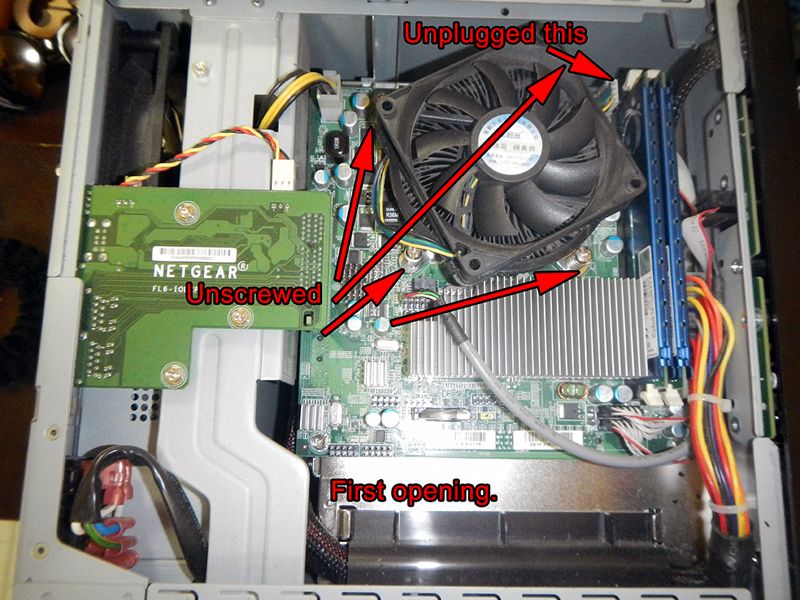
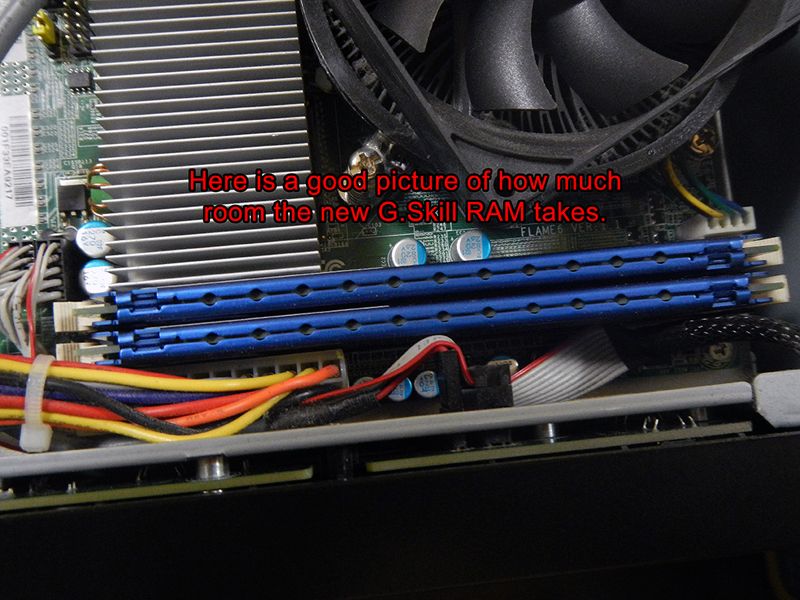
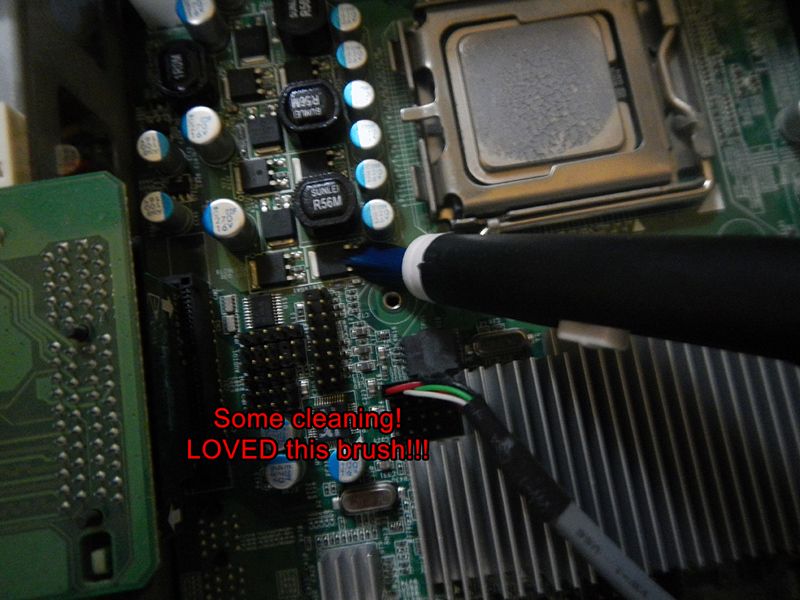
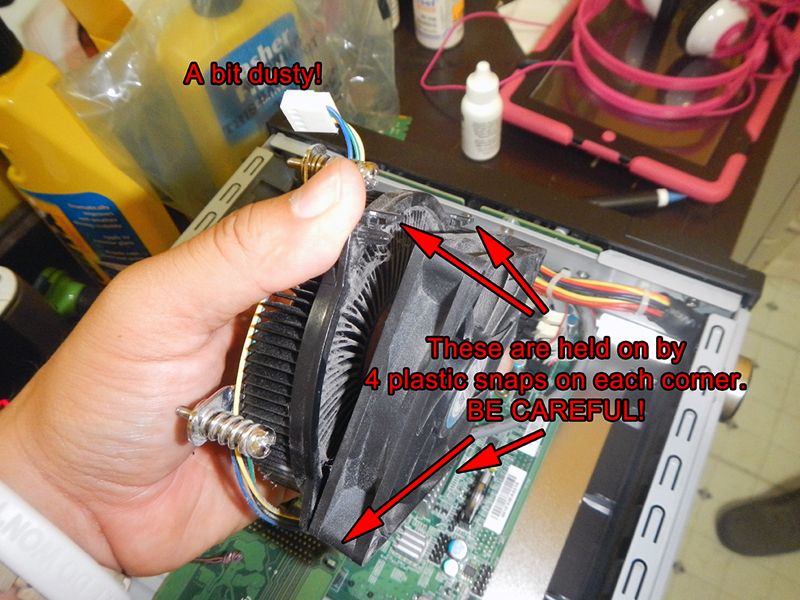
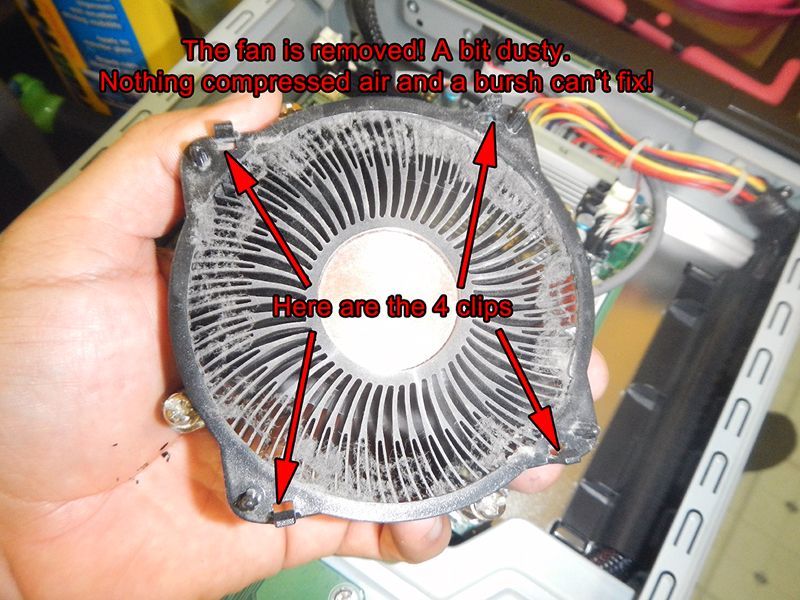
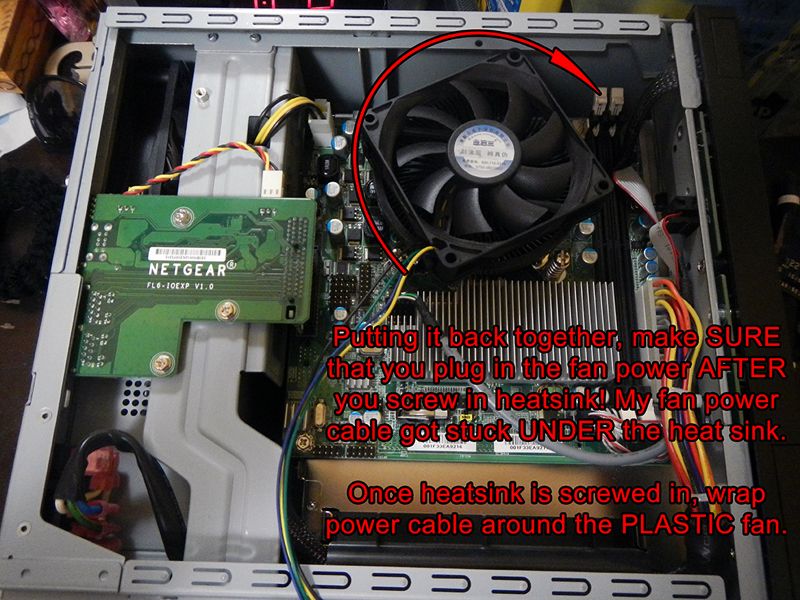
- I know, that power consumption is larger by the processor Q6600.
how much is the difference in temperature ???
Comparition link http://www.cpu-world.com/Compare/705/Intel_Core_2_Duo_E7600_vs_Intel_Core_2_Quad_Q6600.html - fifer55Apprentice
interested wrote: I know, that power consumption is larger by the processor Q6600.
how much is the difference in temperature ???
Comparition link http://www.cpu-world.com/Compare/705/Intel_Core_2_Duo_E7600_vs_Intel_Core_2_Quad_Q6600.html
Here is the first comparison I did. This is using the Intel Core 2 Duo E7600: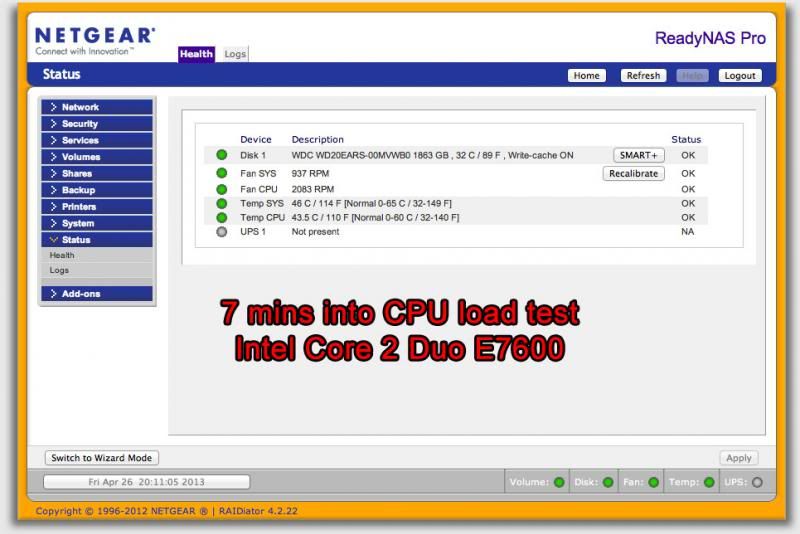
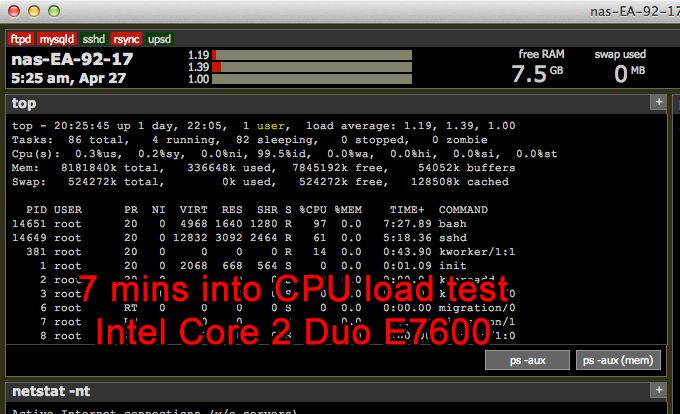
Then I killed the command and waited about 5 minutes: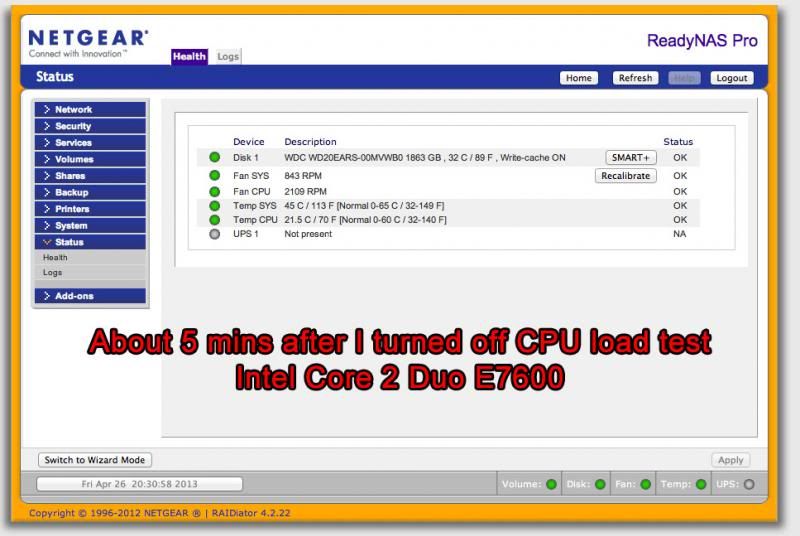
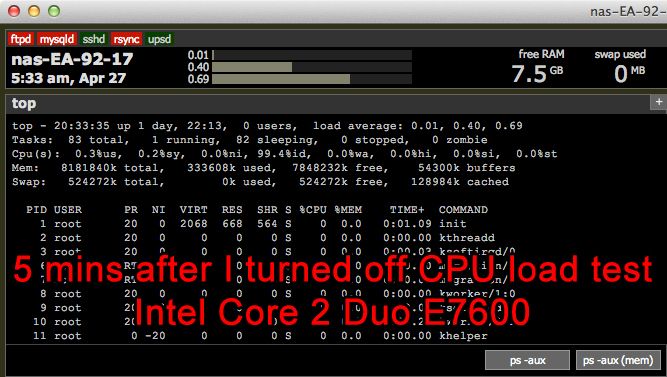
The exact command I used was:while true; do echo; done
Will pop the Intel Core 2 Quad Q6600 back in tomorrow.Excited to see what that does and HOPEFULLY it works!?
Seems the Intel Core 2 Duo E7600 runs cooler at 100% CPU utilization than STOCK CPU. Maybe it was also the thorough cleaning I did? - fifer55ApprenticeOK, I put the Intel Core 2 Quad Q6600 back into the ReadyNas Ultra 6 Plus.
I tried to get as many screenshots as I could.
This is BEFORE I did any CPU load test: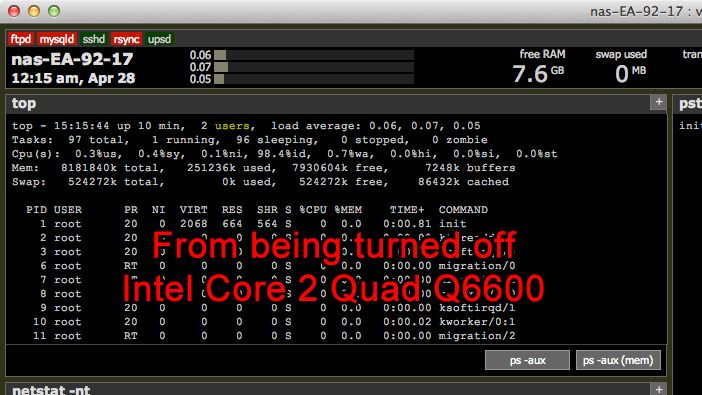
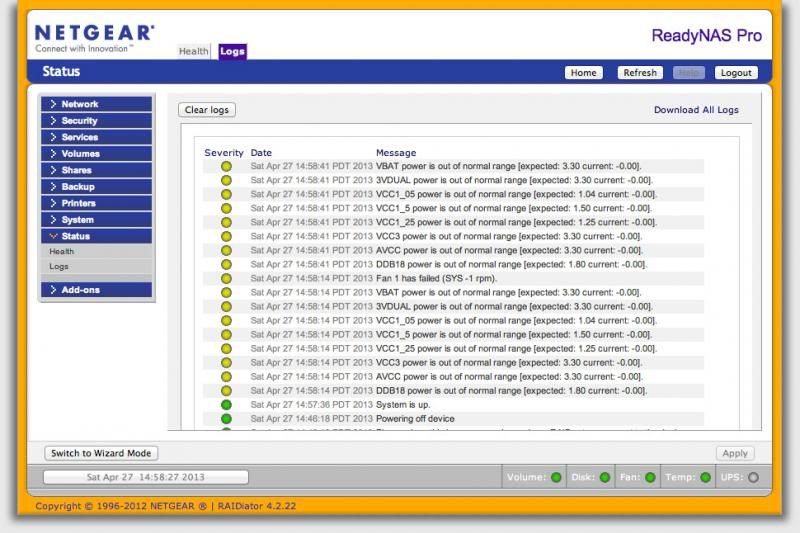
The temp was harder since the SYSTEM temp was reading at about 90 degrees, but there was no temp for CPU. Again, the fan was dead.
This is DURING the CPU load test: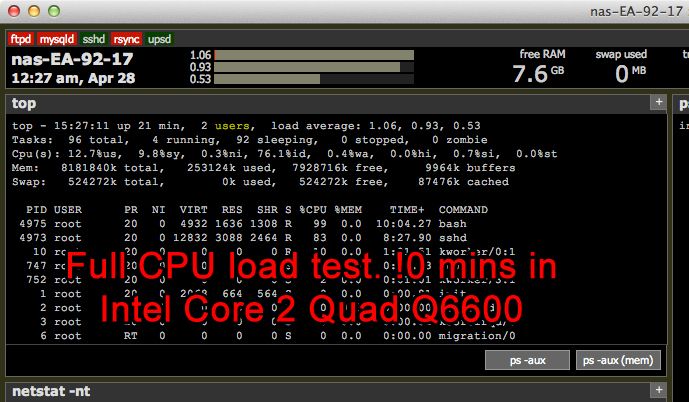
Again, during the CPU load test. the SYSTEM temp never went above 130 degrees.
Finally, after about 10 minutes I killed the CPU load test, waited about 5 mins and this is what I got: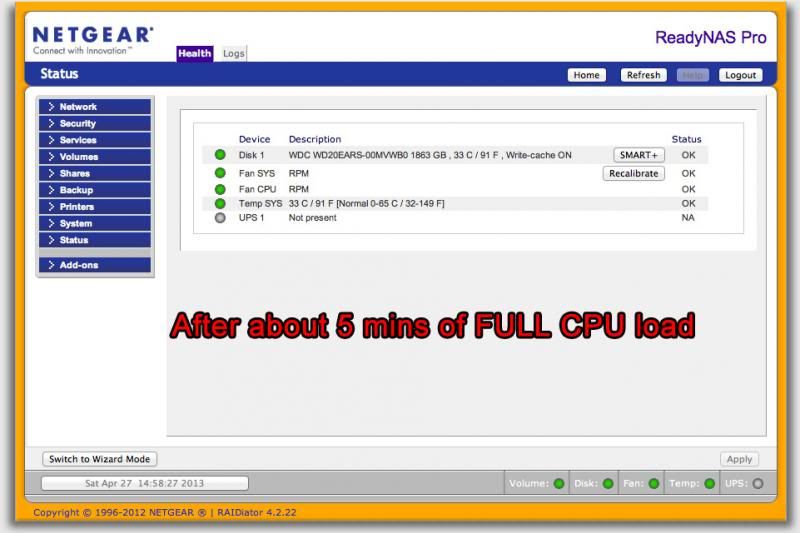
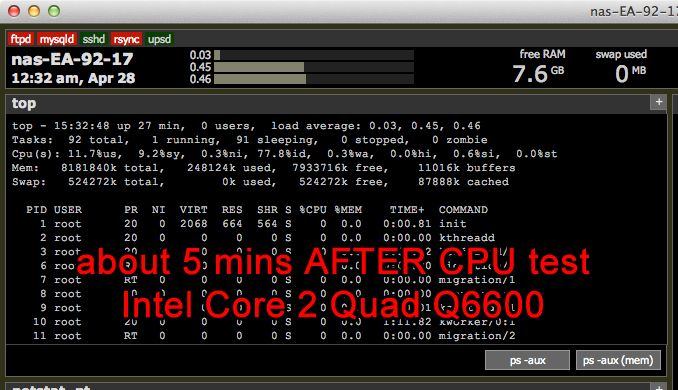
Note that this is all with the sock fans. Unfortunately, I don't know how to check the temp in the CLI via SSH. Anyone care to enlighten me...
By the way, I did notice all the fans were running on the NAS. They seemed to be running at full speed. I decided to check with my iPhone app what the noise level was and it was averaging at 85 dB!!! Way to loud for me! - Which processor did you end up sticking with and were all the fan issues resolved? I am also planning to upgrade the CPU/Ram on my RNDP6000 in hopes of improving transcoding of large 1080p files.
- fifer55Apprentice
juntabravo wrote: Which processor did you end up sticking with and were all the fan issues resolved? I am also planning to upgrade the CPU/Ram on my RNDP6000 in hopes of improving transcoding of large 1080p files.
The processor and fan I ended up with are on my signature.
I was able to have the temperature settings and fan issues resolved with changing the config database file of the temperature controls.
It all works without issues now and great. However, once in a while, especially on warmer days, my CPU temp goes about 65 Celsius on occasion, but not a big deal.
It is on 24/7 (Ultra 6 Pro). The Pioneer pro I hardly ever turn on :(
Related Content
NETGEAR Academy

Boost your skills with the Netgear Academy - Get trained, certified and stay ahead with the latest Netgear technology!
Join Us!
